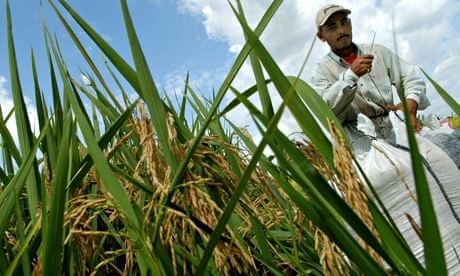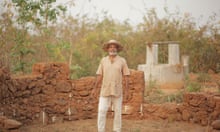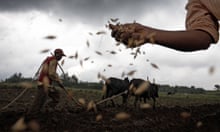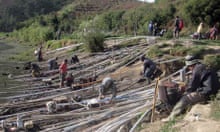Farmers in El Salvador are protesting against a multimillion-dollar grant from a US aid agency that would force the country to open its seed market to international companies.
Last month, farmers protested outside the US embassy in the capital, San Salvador, amid concerns about conditions attached to a grant from the Millennium Corporation Challenge (MCC), an agency established by Congress under the Bush administration a decade ago.
El Salvador has been awarded a $277m (£161m) grant to improve its "competitiveness and productivity in international markets" on condition that the country opens its markets to competition, which would undermine the current system.
The previous Farabundo Martí National Liberation Front (FMLN) government, El Salvador's first leftwing rulers, introduced a seed scheme as a poverty reduction policy. Under the initiative, the poorest 375,000 subsistence farmers are given packets of maize and bean seeds every year. The seeds are locally produced and bought from farmers, providing them with economic opportunities.
The US ambassador to the country, Mari Carmen Aponte, has denounced El Salvador's failure to comply with the conditions attached to the new tranche of money, which led to the protests. Environmentalists and public health experts have also expressed concerned over the conditions.
Ricardo Navarro, director of Cesta, the Salvadoran Centre for Appropriate Technology – an environmental group that is part of Friends of the Earth International – believes that if the MCC gets its way, the country will be flooded with genetically modified seeds, as multinationals will inevitably undercut local producers. "More GM seeds means more pesticides. This would be a big step back and environmentally wrong," Navarro said.
The US insists it simply wants El Salvador to honour its commitment, and denies any link between what it wants and the procurement of GM seeds.
The MCC was established with a pledge to revolutionise the way US aid was awarded, delivered and overseen. It promised to help reduce poverty by promoting economic growth in the world's poorest countries in a way that also benefited Americans.
Poor countries compete for MCC aid packages, known as compacts, by demonstrating their commitment to good governance, free-market principles and investment in people. Organisations such as the World Bank, The International Monetary Fund, the Heritage Foundation, Freedom House, Unesco and the World Health Organisation score countries on 17 indicators, including inflation rates, fiscal and trade policies, civil liberties, immunisation programmes, control of corruption and spending on health.
If successful, the country is awarded a five-year multimillion-dollar grant to fund specific development programmes in areas such as agriculture, transport, water supplies, anti-corruption and education. Countries that nearly make the grade can receive smaller grants, as long as the MCC is convinced that its public policies are going in the right direction.
Grants are often conditional on countries agreeing to certain policy changes, such as opening public services to private contracts and tackling money laundering. The money can be suspended if a country is deemed to be rescinding on its commitments.
El Salvador is the smallest Central American country, and one of three in the region to receive MCC money. It is recovering from the 1979 to 1992 civil war, which left 80,000 people dead, 1 million displaced and huge health and wealth inequalities.
Its 5 million people rely heavily on remittances from the diaspora in the US, who last year sent $4.2bn – more than 15% of El Salvador's GDP. Economic growth plummeted amid the recent global financial crisis, which – together with high levels of violence and organised crime – triggered another exodus to the US. Growth is hovering at about 2% and poverty rates have increased amid falling wages and high unemployment.
Between 2007 and 2012, El Salvador received $461m from the MCC to improve transportation, agriculture and education in the north. The region was subjected to some of the worst massacres and scorched-earth operations during the civil war by US-trained armed forces.
The MCC says services and economic growth improved (pdf) in the region by opening up public services like water and sanitation to investment from US businesses and Salvadoran diaspora.
A similar model to the MCC is being promoted by the G8 in Africa under the New Alliance for Food Security and Nutrition initiative, which has led to a raft of pro-agribusiness policy changes in 10 African countries.







